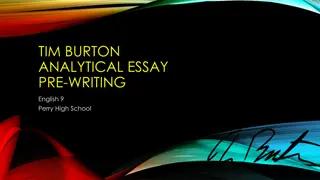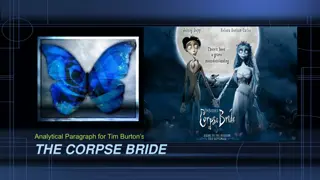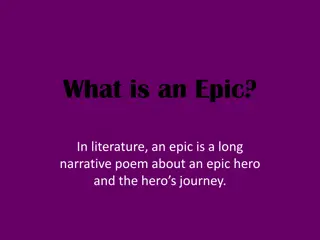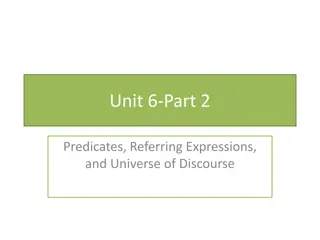
Exploring Homeric Texts: Translations, Similes, and Interpretations
Dive into the world of Professor David Fearn as he delves into Homer's works, discussing translations, Homeric imagery, and the significance of similes. Explore the nuances of different translations, analyze vivid similes from the Iliad and the Odyssey, and ponder the depths of Homer's storytelling. Join the conversation about what makes a translation good or bad, the impact of translators' interpretations, and the intricate descriptions within Homeric texts. Uncover the connections between classical literature and modern interpretations, guided by thought-provoking questions throughout the session.
Download Presentation

Please find below an Image/Link to download the presentation.
The content on the website is provided AS IS for your information and personal use only. It may not be sold, licensed, or shared on other websites without obtaining consent from the author. If you encounter any issues during the download, it is possible that the publisher has removed the file from their server.
You are allowed to download the files provided on this website for personal or commercial use, subject to the condition that they are used lawfully. All files are the property of their respective owners.
The content on the website is provided AS IS for your information and personal use only. It may not be sold, licensed, or shared on other websites without obtaining consent from the author.
E N D
Presentation Transcript
; The Worlds of the Hero Prof David Fearn
Overview 1 starting point: Iliad 9.77 Greek text, 3 translations 3 further passages (two similes from the Iliad, one from the Odyssey) Greek text of each, 3 or 4 translations Q&A (encouraged throughout!) If time, discussion of supplied Pdf and exploration of links with today. article by Alex Purves on the depth of Homeric surfaces
Questions to ponder throughout What makes a translation good or bad, to the extent that this is a fair question? (Given that I m likely to be quite critical of Rieu!) What baggage comes with the way translators translate? Translation as interpretation How do we deal with Homeric imagery: not only what it is ( say what you see , in terms of either or both form and/or content) but what it does (in terms of effect and affect)? What DO Homeric similes describe, to the extent that this is a fair question? And why might this matter? Connection with OCR learning outcome: learners should be able to critically explore and explain the possibility of different responses to a text from different audiences, from the classical period, up until the modern day.'
Starting point: ; Iliad 9.77 Nestor addressing Agamemnon/special council of Achaeans, referring to the Trojan watchfires burning at end of book 8 (a passage I ll present later) 3 translations: Richmond Lattimore (Chicago) What man could be cheered to see this? Robert Fagles (Penguin) What soldier could warm to that? (line 91 in Fagles numbering) E V Rieu (Penguin) Whofinds them a pleasant sight? (no line numbering, as prose translation; italics original) Thoughts?
Simile 1: Iliad 8.302 8 Greek Text Fagles , but he missed and cut Gorgythion down instead, , a well-bred son of Priam, a handsome prince, and the arrow pierced his chest, Gorgythion . whom Priam s bride from Aesyme bore one day, , lovely Castianira lithe as a deathless goddess , As a garden poppy, burst into red bloom, bends, . drooping its head to one side, weighed down by its full seeds and a sudden? spring shower, 3 translations so Gorgythion s head fell limp over one shoulder, weighed down by his helmet. Lattimore but missed his man, and struck down instead a strong son of Priam, Rieu Gorgythion the blameless, hit in the chest by an arrow; He missed, but the arrow landed in the chest of one of Priam s strong sons, handsome Gorgythion, whose mother, lovely Castianeira with a figure like a goddess (!), had come from Aesyme to be married to Priam. As a poppy's head tilts to one side, weighed down in the garden by its seed and the showers of spring, so Gorgythion s head, weighed down by his helmet, dropped to one side. Gorgythion whose mother was lovely Kastianeira, Priam s bride from Aisyme, with the form of a goddess. He bent drooping his head to one side, as a garden poppy bends beneath the weight of its yield and the rains of springtime; so his head bent slack to one side beneath the helm s weight. Thoughts?
Simile 2: Iliad 8.553 8 Greek Text Translation 1 Lattimore , . So with hearts made high these sat night-long by the outworks of battle, and their watchfires blazed numerous about them. , As when in the sky the stars about the moon s shining are seen in all their glory, when the air has fallen to stillness, , and all the high places of the hills are clear, and the shoulders out-jutting, , and the deep ravines, as endless bright air spills from the heavens and all the stars are seen, to make glad the heart of the shepherd; . such in their numbers blazed the watchfires the Trojans were burning , between the waters of Xanthos and the ships, before Ilion. . A thousand fires were burning there in the plain, and beside each one sat fifty men in the flare of the blazing firelight. . And standing each beside his chariot, champing white barley and oats, the horses waited for the dawn to mount to her high place. 3 Translations
Simile 2: Iliad 8.553 8 Greek Text Translation 2 Fagles , . And so their spirits soared as they took positions down the passageways of battle , all night long, and the watchfires blazed among them. Hundreds strong, as stars in the night sky glittering , round the moon s brilliance blaze in all their glory , when the air falls to a sudden, windless calm... all the lookout peaks stand out and the jutting cliffs . and the steep ravines and down from the high heavens bursts , the boundless bright air and all the stars shine clear . and the shepherd s heart exults so many fires burned between the ships and the Xanthus whirling rapids . set by the men of Troy, bright against their walls. A thousand fires were burning there on the plain and beside each fire sat fifty fighting men poised in the leaping blaze, andchamping oats and glistening barley, stationed by their chariots, stallions waited for Dawn to mount her glowing throne.
Simile 2: Iliad 8.553 8 Greek Text Translation 3 , . Rieu So all night long, buoyed up with hopes, they sat along the lines of battle, and many fires burned. As the stars in the sky stand out in all their splendour round the bright moon, when the upper air is still; when every lookout place, headland and mountain ravine stands out, and infinite upper air floods down from the skies; when every star is visible, and the shepherd rejoices in his heart so many were the fires, lit by the Trojans, that could be seen in front of Ilium between the streams of Scamander and the Greek ships. There were a thousand fires burning on the plain, and round each one sat fifty men in the light of its blaze, while horses stood beside their chariots, munching white barley and rye, andawaiting Dawn on her golden throne. , , , . , . . Thoughts?
Simile 3: Odyssey 8.521 31 Greek Text Translation 1 Lattimore So the famous singer sang his tale, but Odysseus , . melted, and from under his eyes the tears ran down, drenching , his cheeks. As a woman weeps, lying over the body , of her dear husband, who fell fighting for her city and people as he tried to beat off the pitiless day from her city and children; she sees him dying and gasping for breath, and winding her body about him she cries high and shrill, while the men behind her, hitting her with their spear butts on the back and the shoulders, , force her up and lead her away into slavery, to have hard work and sorrow, and her cheeks are wracked with pitiful weeping. . Such were the pitiful tears Odysseus shed from under his brows 4 Translations
Simile 3: Odyssey 8.521 31 Greek Text Translation 2 Emily Wilson (Norton) , . So the poet sang. , , Odysseus was melting into tears; his cheeks were wet with weeping, as a woman weeps, as she falls to wrap her arms around her husband, fallen fighting for his home and children. She is watching as he gasps , and dies. She shrieks, a clear high wail, collapsing upon his corpse. The men are right behind. . They hit her shoulders with their spears and lead her to slavery, hard labor, and a life of pain. Her face is marked with her despair. In that same desperate way, Odysseus was crying.
Simile 3: Odyssey 8.521 31 Greek Text Translation 3 Rieu , . Whilethe famous minstrel was singing, Odysseus heart was melting with grief and his cheeks were wet with the tears that ran down from his eyes. He wept as a woman weeps when she throws her arms round the body of her beloved husband, fallen in battle in the defence of his city and his comrades, fighting to save his city and his children from the evil day. She has found him gasping in the throes of death; she clings to him, wailing and lamenting. But the enemy come up and beat her back and shoulders with spears, as they lead her off into slavery and a life of miserable toil, with her cheeks wasted by her pitiful grief. Equally pitifulwere the tears that now welled up in Odysseus eyes. , , , .
Simile 3: Odyssey 8.521 31 Greek Text Translation 4 Finally, Alice Ostwald , . So the great singer sang, but Odysseus liquified. , The tears ran out under his eyelids onto his cheek. , As when a woman crumples over and mourns her husband. He has fallen in full view of his city and his family he was trying to delay the stroke of grief for his children. She sees him dying and gasping, drapes herself on his body, , screaming a shrill sound. And the men behind are hitting her head and shoulders with their spears. . And they lead her away to slavery, to suffer hard work and sadness, and her face is sucked in with pitiful grief. So Odysseus was pouring out pitiful tears from his eyelids. Thoughts? https://www.youtube.com/watch?v=UUiSmsmfMWg&t=678s
For Ostwald, a simile about similarity, and a simile about tears, tears as the messengers of similarity: The way that widow interrupts the narrative with her weeping, not as a ghost, or a sign, or a memory, but as a stranger in the language, with her own vivid existence, the way her scream goes on damaging the mind: that tells me something about grief itself and how poetry might rise to meet it. See also her comment in a 2011 interview: My hope is that the similes will repair what gets broken by the biographies [the poetic obituaries the Iliad frequently offers] in the same way that the natural world does. I think of simile as a healing art.
Grethlein (2015) 31314: It has been debated how much we should press this remarkable passage. The simile is closely related to the topic of Demodocus s song: the mourning of the female prisoner of war can be read as a sequel to the ruse that allowed the Greeks to enter the walls of Troy. The husband who falls in front of the city defending his city and family may even evoke Hector more specifically. In the view of many interpreters, the links between simile and Demodocus s song insinuate that Demodocus s song puts Odysseus into the shoes of his victims: like Achilles and Priam in Iliad 24, Odysseus senses the human condition that defines his enemies as well as him. Pointing out that Odysseus is only said to cry like the widow, others, including Schopenhauer, suggest more cautiously that Odysseus is affected by the contrast between his heroic stature in the Trojan War and his more recent ordeals. For the purposes of my argument, it is crucial that the response to a mere recital be compared with the reaction not only to an actual event, but to such a profound experience as the death of one s husband. Aesthetic experience is thereby aligned with intense real life experiences. The comparison gains additional force through a double inversion: a male victor is juxtaposed with a female victim. This drives home the defenselessness of Odysseus against the emotions instilled in him by the recital. Less obvious, but perhaps even more noteworthy, is the alignment of Odysseus s listening with the woman s seeing. Along with the inversion of gender and role, the conflation of the senses highlights the intensity of reception experience More specifically, it adumbrates the rhetorical category of enargeia (vividness) that would figure very prominently in critical treatises of the Imperial Age. The most salient aspect of enargeia, rooted in the word s etymology, is visual appeal. It is frequently defined as speech bringing what is being explained before the eyes. In encapsulating the concept of enargeia, the simile of the crying widow, itself highly visual, bridges the gap between narrative and theory as well as that between the Archaic and Imperial Ages. Odysseus s tears thus indicate that, far from being predicated on the aloof stance of disinterestedness, the reception process is an intense experience that involves strong feelings and even a physical reaction. It would, however, be too easy to take Odysseus s reaction as a smooth mirror for the response of the Odyssey s audience. The Phaeacians indulge in the performance without signs of distress and thereby throw into relief Odysseus s peculiar position. While Plato and Gorgias muse on recipients who feel the sufferings of others as their own, Odysseus witnesses an account of his own adventures. His position is therefore markedly different from that of the Homeric audience. It is equally questionable, though, to see in the Phaeacians a straight model. The life of the Phaeacians reflects aspects of a Golden Age, just as Scheria is reminiscent of the Island of the Blessed. Alcinous and his people live a life of ease that is a far cry from the world of ordinary heroes and even more so with regard to Homer s audience. Their detachment is sui generis. A critic therefore remarks: Perhaps Odysseus s tears more accurately figure the norm for Homer s audience as well as for Aristotle s. [Walsh, The Varieties of Enchantment (1984), 5.] I think it is neither necessary nor helpful to choose one over the other. The diverging reactions of the Phaeacians and Odysseus rather outline a spectrum across which the various responses of Homer s audience can range: somewhere from detached pleasure to strong involvement including tears. Besides illustrating the intensity that aesthetic experience can gain, Demodocus srecital reveals the wide range of possible responses and their dependence on the stance of the recipient.
Grethlein (2015) 316: The Odyssey highlights the experiential character of responses to narrative ... Narrative is more than a means of representation; the strong reactions it can provoke drive home its capacity[?] to create presence. While underscoring the immersive appeal of narrative, the Odyssey does not fail to note the distance constitutive of aesthetic experience. The interaction between reflection on narrative and narrative itself adds to the complexity of these reflections. The response of the Odyssey s recipients does not simply map onto the reactions of the Odyssey s listeners. The two audiences are rather hinged together in a way that lets them grind against each other. Sometimes the external audience smoothly continues the reaction of the internal audience; sometimes it rubs against it. The simultaneous generation of, and reflection on, aesthetic experience gives metanarrative an additional twist and makes it more intriguing than theoretical treatises.
References and further reading (all articles available as pdfs on request: D.W.Fearn@warwick.ac.uk) Buxton, R. 2004. Similes and other likenesses , in R. Fowler (ed.) The Cambridge Companion to Homer (Cambridge), 139 55. Foley, H. 1978. Reverse similes and sex r les in the Odyssey , Arethusa 11: 7 26. Grethlein, J. 2015. Aesthetic experiences, ancient and modern , New Literary History 46: 309 33. Payne, M. 2014. The natural world in Greek literature and philosophy , Oxford Handbooks Online. DOI: 10.1093/oxfordhb/9780199935390.013.001 Purves, A. 2016. Feeling on the surface: touch and emotion in Fuseli and Homer , in S. Buttler (ed.) Deep Classics: Rethinking Classical Reception (London), 67 85. [pre-circulated] Thalmann, W. G. 2015. Anger sweeter than dripping honey : violence as a problem in the Iliad , Ramus 44: 95 114.

![❤[READ]❤ Cosmic Biology: How Life Could Evolve on Other Worlds (Springer Praxis](/thumb/21556/read-cosmic-biology-how-life-could-evolve-on-other-worlds-springer-praxis.jpg)




















